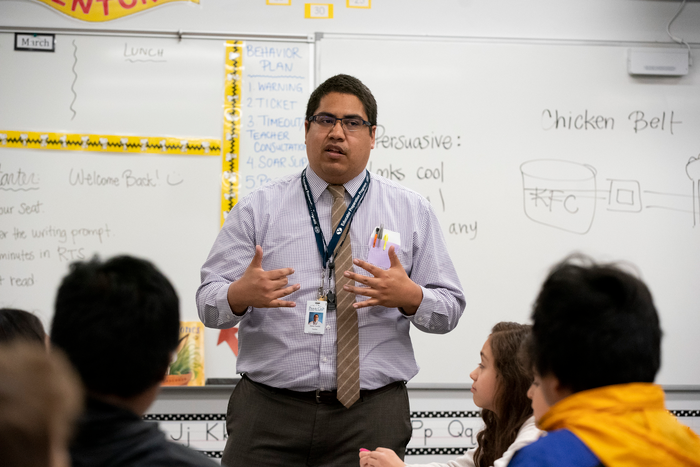Study finds praising middle school students improves behavior by over 60%
Students speaking out of turn, texting, falling asleep in class, making distracting gestures, managing these behaviors is all in a days work

[August 25, 2021: Brigham Young University]
Research from BYU professor Paul Caldarella found that when teachers praise students more often than correcting them behavior improves dramatically. (Credit: Jaren Wilkey/BYU Photo)
Students speaking out of turn, texting, telling rude jokes, falling asleep in class, making distracting gestures — managing these behaviors is all in a day’s work for many middle school teachers, who shepherd adolescents through some of their most trying years. Add in the disruptions of a global pandemic to exacerbate student anxiety and depression, and this year middle school teachers may find themselves with more challenging behaviors to address than ever before.
But a recent BYU paper points out the power of focusing on the positive in sixth through eighth grade.
The study found that when middle school teachers praised students at least as often as they reprimanded them, class-wide on-task behavior improved by 60–70%. Students at high risk for emotional and behavioral disorders were also more likely to be on task, and their classroom marks went up by a full letter grade, compared to high-risk students in classrooms where teachers rarely offered praise. While there was no magic ratio, when teachers praised students more often than correcting them, or even stopped reprimanding completely, behavior improved dramatically — every bit of praise counts.
“With middle school students, we really want to emphasize praising over reprimanding,” said BYU David O. McKay School of Education professor Paul Caldarella. “Especially if you have a student who is depressed, anxious, angry or dealing with any kind of emotional difficulty, the more you can praise and the less you reprimand, the better outcomes you’re likely to see.”
Caldarella and his colleagues Ross Larsen and Leslie Williams at BYU and Howard Wills at the University of Kansas conducted the study as a follow up to their previous research in elementary school classrooms, where they similarly found that the more teachers praised than reprimanded, the more students stayed on task. However, in the new research they found that the results were even more profound in middle schools, with praise producing double the improvement in on-task behaviors compared to elementary classrooms.
The more powerful effect may be due to adolescents’ unique developmental needs and the challenges they typically face, such as hyperactivity, anxiety or exposure to bullying.
“As students get older, we often just expect that they’re going to be more mature and do what’s expected of them,” explained Caldarella. “But they actually still need the same kind of reminders as elementary students. And any kind of negative comment made publicly to image-conscious teenagers, who are trying to establish their identity and peer relationships, is likely to make them shut down or get aggressive. So, it’s better to praise publicly and correct in private.”
For their study, the researchers observed 28 classrooms across five middle schools. In their baseline observations, they noted that teachers gravitated toward reprimanding statements — such as with negative comments or harsh redirections — four to nine times as often as they used praise statements, perhaps because it’s human nature to notice inappropriate behavior more easily than appropriate behavior.
After initial observations, the researchers trained half the teachers to pause every few minutes to scan the classroom and praise students behaving well in the moment. For example, a teacher might say, “I like the way you’re on task” or “I like the way you raised your hand to ask a question, which is really helpful for me as a teacher.” Once trained, most of the teachers were able to implement at least a 1:1 ratio of praise to reprimands. The observers then examined students’ on-task behavior and grades in the trained teachers’ classrooms as well as those in the control classrooms.
The study’s findings about the power of praise hold much promise for teachers hoping to improve learning outcomes and create a better experience for both students and themselves.
“Especially with students coming back from a year grappling with COVID, it’s really going to be important to try to focus on the positives this year,” Caldarella noted. “If you go into a classroom where there’s plenty of praise, you feel better and want to be there, and you behave accordingly.”
For more science stories check out our New Discoveries section at The Brighter Side of News.
Like these kind of feel good stories? Get the Brighter Side of News' newsletter.
Tags: #New_Discoveries, #Teachers, #Students, #Focus, #Behavior, #Productivity, #Praise, #Positive_Reenforcement, #The_Brighter_Side_of_News
Joshua Shavit
Science & Technology Writer | AI and Robotics Reporter
Joshua Shavit is a Los Angeles-based science and technology writer with a passion for exploring the breakthroughs shaping the future. As a contributor to The Brighter Side of News, he focuses on positive and transformative advancements in AI, technology, physics, engineering, robotics and space science. Joshua is currently working towards a Bachelor of Science in Business Administration at the University of California, Berkeley. He combines his academic background with a talent for storytelling, making complex scientific discoveries engaging and accessible. His work highlights the innovators behind the ideas, bringing readers closer to the people driving progress.



